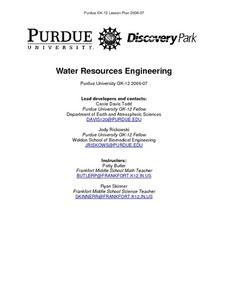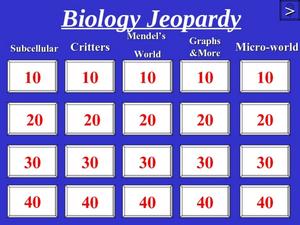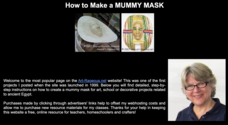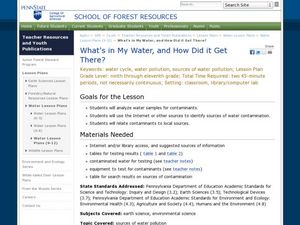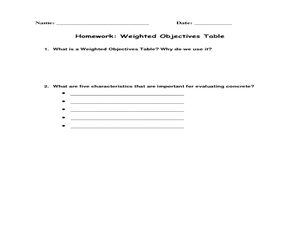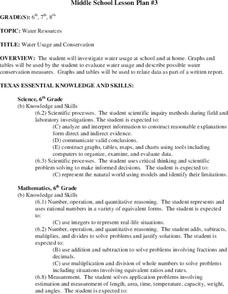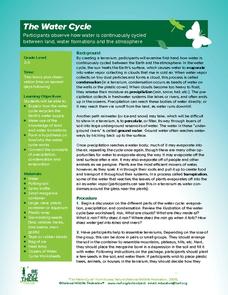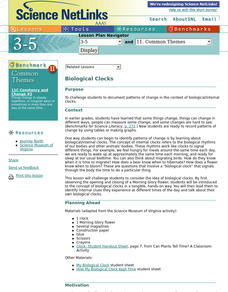Curated OER
Chemistry Review
In this chemistry review worksheet, students identify chemical changes, isotopes, ions, and chemical bonds. This worksheet has 32 multiple choice questions.
Curated OER
Water Resources Engineering
Students illustrate the chemical differences between surface and tap-water. They investigate the common chemical and physical parameters relevant for water quality and gain hands on experience with water quality testing.
They enhance...
Curated OER
Summer Water & Sand Activity: Mud Pies and More
In this lesson, Summer Water & Sand Activity: Mud Pies and More, students investigate mud while playing and creating with it. Students understand mud, what it is, and how it is formed. Students develop their creativeness by making...
Curated OER
Biology Jeopardy
Play Jeopardy as you review what might possibly be an entire year's high school biology course! The vast variety of questions requires that you read through the slides to make sure that they all relate to your curriculum. You could make...
Curated OER
How to Make a Mummy Mask
With some plaster casting materials and a quick lesson on the ancient burial traditions of Egypt, your class can create amazing mummy masks. Listed here are all the tools, precautions, and steps needed for each child to make an Egyptian...
Cornell University
Making a Battery
Don't be shocked when your class has a blast making their own batteries! Science scholars examine a dry cell battery, then design and construct a wet cell battery. The activity guides them through the parts of a battery, the variables...
Curated OER
What's in My Water, and How Did it Get There?
Students analyze water samples to see the contaminants and then use the Internet to find the sources of the contamination. In this investigative water lesson students analyze water and work together to solve the mystery of...
Core Knowledge Foundation
Animals and Habitats Tell It Again!™ Read-Aloud Anthology
A read-aloud anthology explores various habitats and the animals that inhabit them, from the Artic to the desert, the forest, and bodies of water. First graders listen to and discuss texts and complete word work. Each lesson offers...
Curated OER
Weighted Objectives Table and Optimum Mix Sheet
Young scholars analyze data and determine an appropriate concrete mixture. In this technical solutions activity, students discuss weighted objectives, review sample scenarios, and rate concrete recipes to identify how well water...
Curated OER
How Texas is Planning To Manage Its Water
Students research water management strategies in Texas. They analyze projected demand for water in the year 2050, interpret graphs and tables and then discuss the data as part of a written report. They research and map the locations of...
Curated OER
Breaking News English: Moon Water
In this water on the moon worksheet, students read the article, answer true and false questions, complete synonym matching, complete phrase matching, complete a gap fill, answer short answer questions, answer discussion questions, write,...
Curated OER
The Water Cycle
Students list the nine places on earth where water is found. They define the terms cycle and water cycle. Students explain how energy from the sun powers the movement of water molecules through the water cycle. They name and describe...
US Department of Agriculture
Sink or Float?
Will it sink or will it float? Learners predict the outcome as they drop random objects into a container of water. Then, they keep track of the results and record the data in a t-chart to draw a final conclusion.
Curated OER
Unit 3: Scientific Writing
Write-on! Demonstrate a writing model and support learners as they write an informational essay on a water resource issue of your (or their) choosing. The lesson plan provides a well-scaffolded summative writing...
Creative Chemistry
Reactions of Group 1 Metals With Water
In this elements worksheet, students complete a graphic organizer comparing lithium, sodium, and potassium observations. Then, they determine how these elements react with water. Students complete three fill-in-the-blank questions.
Curated OER
Water Usage and Conservation
Young scholars investigate water usage at school and at home. They use graphs and tables to evaluate water usage. Students describe possible water conservation measures. They use graphs and tables to relate data as part of a written report.
Curated OER
Why Oil and Water Don't Mix
Second graders explore why oil and water do not mix. They make and record their predictions and observe the experiment in which cooking oil is mixed with a glass of water. Students discuss why they think the oil and water did not mix and...
Curated OER
Make Your Own Recipe
Students make their own recipe. In this art lesson, students mix dry ingredients with a little water and see the changes made.
Curated OER
The Water Cycle
Students are introduced to the components and importance of the water cycle. They are shown how groundwater moves using a model. Students list 9 places on earth where water is found. They define the terms cycle and water cycle.
Curated OER
Water Quality in the Greenhills Stream
Seventh graders conduct year long study of water quality over different seasons using variety of probes, including D.O., pH, conductivity and temperature, that are attached to portable technology. Students select three data points in...
Curated OER
Making "Cents" of Surface Tension
Students explore the unique behaviors of water. They investigate surface tension using water drops on a penny and pennies dropped in a cup.
Curated OER
Water and Ice
Students conduct an experiment. In this forms of water instructional activity, students observe ice to see what changes take place and then write in their journal about what they observed.
Curated OER
The Water Cycle Game
Students study the path and forms of water through Earth. In this water cycle lesson, students role-play water as it moves throughout the Earth. Students play the water cycle game and complete various stations to learn about water forms...
Curated OER
Water 1: Water and Ice
Students investigate water in its solid and liquid form. In this states of matter instructional activity, students experiment to see what happens as water goes from a solid, ice, to a liquid, water, and back again. They write about and...

